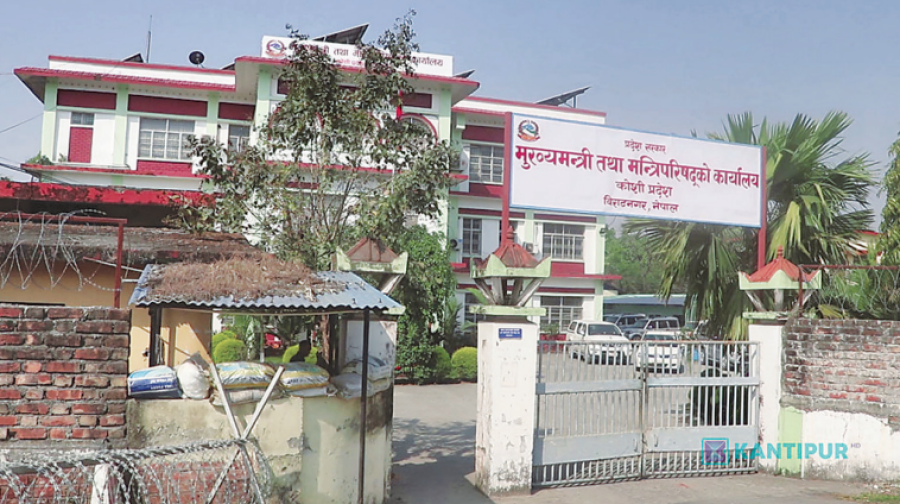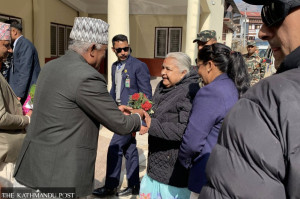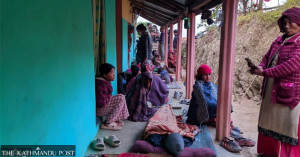Koshi Province
Ordinance budget adds to Koshi government’s troubles
Opposition parties vow to shoot down the budget. Province’s name is already under question and the current government has fallen into minority.
Nishan Khatiwada
Earlier, the Koshi province was facing two problems—one related to its nomenclature and the other being the UML-led government falling into minority. And now, there is one more.
The Koshi provincial government on Thursday unveiled a Rs36.24 billion budget for the fiscal year 2023-2024 through an ordinance. Opposition parties that had earlier warned the chief minister against governing through ordinances, say they will not support the budget brought by bypassing the provincial assembly and have vowed to shoot it down.
Chief Minister Hikmat Kumar Karki, who is also the Minister for Financial Affairs and Planning, announced the provincial government’s programmes for the coming fiscal year. The UML-led government had lost its majority after the CPN (Maoist Centre) withdrew its support this month.
Koshi Province Head Parshuram Khapung on Wednesday had prorogued the provincial assembly after the government presented its policies and programmes. A day later, on Thursday, Khapung authenticated the ‘Koshi Province Financial Ordinance 2023’ and ‘Koshi Province Appropriation Ordinance 2023’.
Indra Kumar Angdangbe, parliamentary party leader of the Maoist Centre in Koshi, said that the budget was brought through ordinances by going against the spirit of the constitution. “The ongoing session of the provincial assembly was prorogued all of a sudden just to bring the budget through ordinance,” he said.
Angdangbe said ordinance should be used as a last resort in difficult situations like an emergency.
Binod Rai, a lawmaker from the Nepali Congress in Koshi, said the Nepali Congress does not at all support a budget brought through ordinances. “The chief minister has made a mistake, and we will not make another mistake by endorsing the ordinance.”
Article 207 of the constitution states that the provincial finance minister should present the annual budget at the provincial assembly.
Similarly, Article 202 (1) of the constitution states, “In case, at any time, except when the Provincial Assembly is in session, a circumstance exists which renders it necessary to take immediate action, the chief of the province may, on the recommendation of the provincial council of ministers, promulgate an ordinance.”
The Koshi government has allocated Rs14.39 billion for recurrent spending, which consists of regular expenses of salaries and allowances. It has set aside Rs18.23 billion for capital spending, Rs10 million for financial management and Rs3.60 billion for transfer to local governments.
“We will not endorse the budget. It will not pass the provincial assembly. Moreover, the chief minister will not win a vote of confidence,” said Angdangbe.
There are doubts about whether the provincial budget, brought by a minority government, will be implemented.
Article 202 of the constitution says ordinances become ineffective if they are not endorsed within 60 days from the first sitting of the new provincial assembly session.
In the 93-member provincial assembly, the UML has 40 seats, the Congress 29, the Maoist Centre 13, the RPP 6, the CPN (Unified Socialist) 4, and the Janata Samajbadi Party has one seat.
“The chief minister will not get the vote of confidence, and the ordinance too will lapse,” said Rai.
Provincial politics in Koshi was facing twin troubles—one is the flaring up of ethnic sentiments after the nomenclature of the province and others related to the tricky numerical strength of the parties in the assembly. Central alliance of political parties has been struggling to form a provincial government and the recent naming of the province has led to violent protests.
Rai, the Congress lawmaker, added that the chief minister has failed on moral grounds at a time the province is already facing other serious problems. “Such an immoral act of bypassing the provincial assembly to bring the annual budget will further create problems and difficulties in delivery.”
CPN-UML provincial leaders say they were obliged to bring the budget through ordinance and according to them, those who claim they will shoot down the budget are opposed to constitutionalism.
“We would have brought the budget from the assembly if we had a clear majority. But at the same time, we did not want to push the province into an economic crisis by stalling the budget,” said Rewati Bhandari, UML’s Koshi province Chief Whip.
“Someone has to bring the budget. Whether we have a majority or not will be proven at the assembly floor.”




 8.65°C Kathmandu
8.65°C Kathmandu













